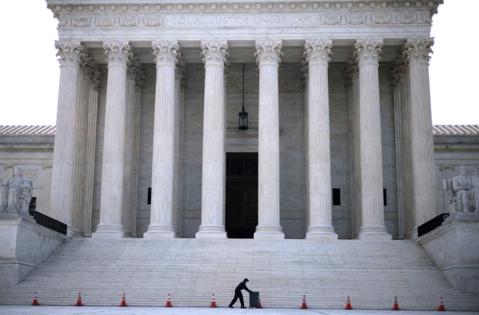Nationwide or nowhere? Supreme Court weighs power to block Trump's citizenship crackdown
Published in Political News
WASHINGTON — The Supreme Court will hear oral arguments on Thursday in a case that will help frame President Donald Trump’s power to end automatic citizenship for children born in the United States whose parents didn’t enter the country legally.
The emergency appeal hearing stems from a January executive order signed by the president and blocked by a trio of federal judges in Washington state, Maryland and Massachusetts. The high court is not expected to rule directly on the constitutionality of the 14th Amendment, with justices focused instead on the reach of judicial restraints and whether lower courts hold the authority to issue nationwide injunctions that apply across the entire country.
But the core of the challenge centers on a long-established American value of how citizenship is attained.
“The government’s essentially saying, ‘We want to be able to deny babies the citizenship that is guaranteed in the constitution even though we’re not prepared to actually make the case that we’re going to win.’ And that makes sense, because they’ve lost for every single court below,” said Cody Wofsy, deputy director for the ACLU Immigrants’ Rights Project, whose organization helped file the legal challenge.
The 14th Amendment
The principle that nearly anyone born on U.S. soil is automatically a citizen has been a settled interpretation of the 14th Amendment for more than 150 years. The 14th Amendment’s citizenship clause states: “All persons born or naturalized in the United States, and subject to the jurisdiction thereof, are citizens of the United States and of the State wherein they reside.”
Trump has called that reading of the law “ridiculous,” and his executive order argues that the amendment does not require citizenship for children of undocumented immigrants or temporary visa holders and that its application has deviated greatly from the original intentions. If the court green-lights the president’s order, federal agencies would stop issuing documents like Social Security cards and passports to children born to non-citizens.
Stephen Miller, a White House deputy chief of staff and architect of Trump’s immigration policy, has described a scenario in which an undocumented immigrant comes into the country while pregnant, allowing the family to gain residency and access to a plethora of benefits. Miller argues that incentive is the primary catalyst for illegal immigration into the country, a problem that overwhelmed the Biden administration and was an impetus for Trump’s return to the White House.
“Birthright citizenship represents the largest and most expensive scam in financial history,” Miller said during an April appearance on Newsmax.
Multiple federal judges have found that the president cannot unilaterally alter the Constitution’s clear language through executive order alone.
The high court is tasked with considering whether these federal judges have the power to issue sweeping injunctions that block executive actions for the entire country, or whether such rulings should be limited only to the plaintiffs in a given case or specific jurisdiction.
Trump administration attorneys have asked the court to narrow judicial injunctions, leaving the executive order in place elsewhere while litigation continues.
But supporters of nationwide injunctions argue that piecemeal enforcement of citizenship rules would create chaos and confusion, while undermining a fundamental right.
“Are we really like weeks away from North Carolina and South Carolina having different citizenship laws?,” asked Todd Schulte, President of FWD.us, a progressive group organizing opposition to the order. “People who are building their lives here, they have kids ... we’re going to have different citizenship goals? It would be a terrible, harmful outcome, even temporarily.”
Support for birthright citizenship is sharply divided by party: 76% of Democrats support automatic citizenship for all U.S.-born children, compared to 54% of Independents and 26% of Republicans, according to a YouGov poll conducted in January and February.
Far-reaching effects
Research suggests that ending birthright citizenship would have far-reaching demographic effects. According to projections from the Migration Policy Institute and Penn State’s Population Research Institute, repealing birthright citizenship could increase the unauthorized immigrant population by millions over the coming decades, as children born in the U.S. would no longer automatically become citizens.
Each year, roughly 255,000 children could be born without U.S. citizenship, creating a growing population of stateless residents, according to the data.
Trump has falsely claimed that the United States is the only country in the world that offers birthright citizenship. In fact, three-dozen countries grant similar citizenship status, including Argentina, Colombia, Cuba, El Salvador, Nicaragua and Venezuela.
The case, Donald J. Trump, et al. v. CASA, et al., could reshape the balance of power between the executive branch and the courts, with implications for further lawsuits, particularly if the high court chooses to limit the lower court injunctions to certain states.
A ruling in the case is expected by late June or early July before the court recesses for summer.
_____
©2025 McClatchy Washington Bureau. Visit at mcclatchydc.com. Distributed by Tribune Content Agency, LLC.



























































Comments